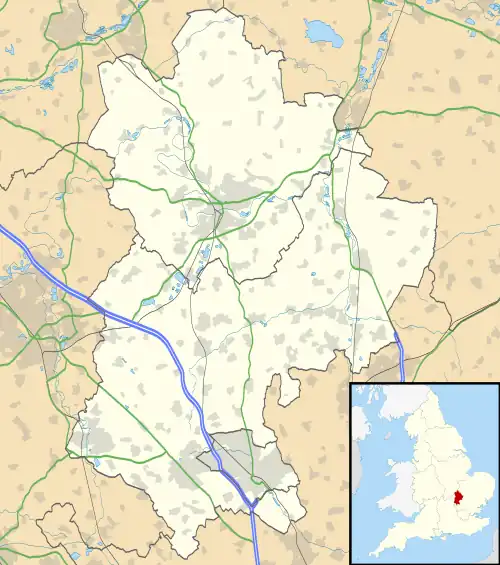Whipsnade
Whipsnade is a small village and civil parish in Bedfordshire, England. It lies on the eastward tail spurs of the Chiltern Hills, about 2+1⁄2 miles (4.0 km) south-south-west of Dunstable on the top of the Dunstable Downs, which drop away steeply to the south of the village.[2]
| Whipsnade | |
|---|---|
 Church of St Mary Magdelene, Whipsnade (August 2006) | |
 Whipsnade Location within Bedfordshire | |
| Population | 420 (2011 census)[1] |
| OS grid reference | TL010179 |
| Unitary authority | |
| Ceremonial county | |
| Region | |
| Country | England |
| Sovereign state | United Kingdom |
| Post town | DUNSTABLE |
| Postcode district | LU6 |
| Dialling code | 01582 |
| Police | Bedfordshire |
| Fire | Bedfordshire and Luton |
| Ambulance | East of England |
| UK Parliament | |
Etymology
Whipsnade is a compound of the Anglo-Saxon personal name, Wibba, with the word "snæd", an area of woodland. Therefore, the name means "Wibba's wood".[2] A variation may be seen as "Wystnade" in a legal record of 1460, where named people in Dunstable were accused of trespassing. [3]
History
The village was first mentioned in a coroner's roll of 1274 when Whipsnade Wood was described as being within the parish of Houghton Regis.[2] The Old Hunters Lodge at the Crossroads in the village is a Grade II listed building, built in the early 17th Century. It is now a hotel and is the only licensed premises in the village outside the ZSL grounds.[4]
Edward John Eyre, explorer of Australia, was born in Whipsnade in 1815.[5]
The parish of Whipsnade used to have a detached part at Ballingdon Bottom, which formed an exclave of Bedfordshire, surrounded by Hertfordshire. The county boundary was changed in 1844, transferring Ballingdon Bottom to Hertfordshire. For parish purposes, it remained a detached part of Whipsnade. When district councils were established in 1894, the main part of Whipsnade parish was included in the Luton Rural District in Bedfordshire, whilst Ballingdon Bottom became part of the Markyate Rural District in Hertfordshire. The parish boundaries were rationalised in 1897 when Ballingdon Bottom was transferred to the parish of Flamstead.[6][7][8]
In the 2011 census, the population of Whipsnade was 420, a decline from 458 in 2001.[2]
Landmarks
Whipsnade is home to Whipsnade Tree Cathedral, a 9+1⁄2 acres (3.8 ha) arboretum planted in the arrangement of a cathedral, and Whipsnade Zoo. A chalk hill figure of a lion can be found on Bison Hill, created in 1933; it is owned by the zoo. It is the longest hill figure in England at 483 feet (147 m). During the Second World War, the lion was covered with a black tarp to prevent German bomber planes from using it for navigation.[9] Whipsnade Park Golf Club is also in the vicinity, though it is actually in neighbouring Dagnall.[10]
The local Wildlife Trust manages a small nature reserve north of the village called Sallowsprings (51.8559°N 0.5391°W).[11]
References
- "Civil Parish population 2011". Neighbourhood Statistics. Office for National Statistics. Retrieved 13 November 2016.
- "The Parish of Whipsnade in General". Bedford Borough Council. Retrieved 17 March 2020.
- first entry in http://aalt.law.uh.edu/AALT1/H6/CP40no799/aCP40no799fronts/IMG_0332.htm
- "Old Hunters Lodge Hotel: The Cross Roads, Whipsnade". Bedford Borough Council. Retrieved 17 March 2020.
- "Eyre, Edward John (1815–1901)". Australian Dictionary of Biography. Retrieved 17 March 2020.
- "Whipsnade Tithe Apportionment 1842–1844". Bedfordshire Archives Catalogue. Bedford Borough Council. Retrieved 28 September 2021.
Parish, including detached portion called Ballingdon Bottom.
- Counties (Detached Parts) Act 1844 (7 & 8 Vict. c. 61)
- Local and Personal Acts. London: Her Majesty's Stationery Office. 1897. p. 561. Retrieved 26 September 2021.
The Counties of Bedford and Hertford (Caddington, &c.) Order 1897
- "Whipsnade Zoo's Big Help Out volunteers weed giant lion for Coronation". BBC News. 8 May 2023. Retrieved 17 July 2023.
- "Whipsande Park Golf Club". Whipsnade Park Golf Club. Retrieved 17 March 2020.
- "Sallowsprings". Bedfordshire Cambridgeshire Northamptonshire Wildlife Trust. Retrieved 17 March 2020.
External links
![]() Media related to Whipsnade at Wikimedia Commons
Media related to Whipsnade at Wikimedia Commons